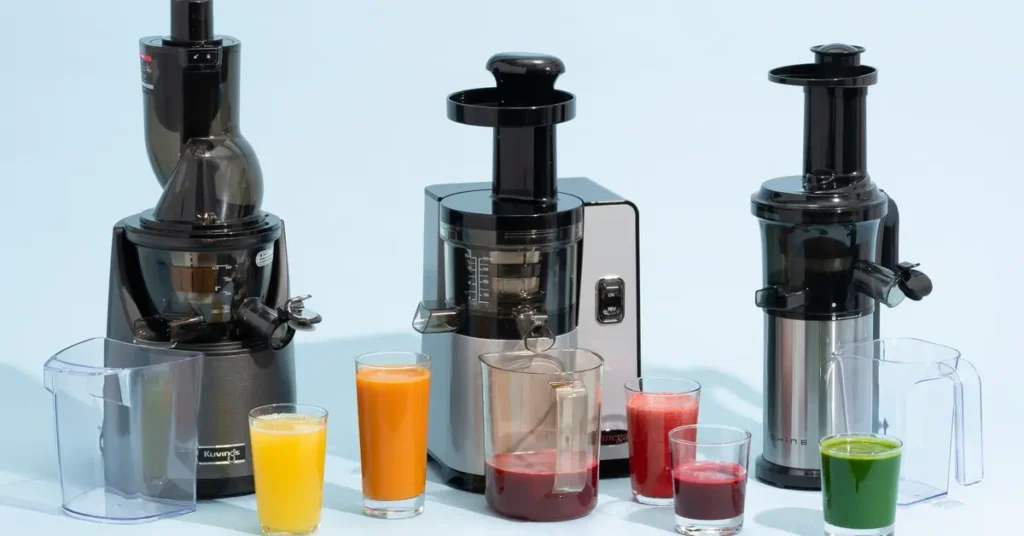Introduction
Juicing has become an increasingly popular way to boost health, allowing you to enjoy concentrated nutrients in a convenient, delicious form. Whether you’re seeking to enhance your daily fruit and vegetable intake or embarking on a wellness journey, a good juicer can make all the difference. However, choosing the healthiest juicer can be challenging, given the variety available on the market. From centrifugal to masticating to triturating juicers, each type offers unique benefits and features. In this guide, we’ll explore these different types of juicers and provide insights to help you make the best choice for your needs.

Centrifugal Juicers
Centrifugal juicers are among the most commonly used and affordable juicers on the market. They use fast-spinning blades to extract juice by shredding fruits and vegetables and separating the juice from the pulp through centrifugal force.
- How They Work: Centrifugal juicers work at high speeds, typically around 3,000-10,000 RPM (revolutions per minute). The juicer’s blades rapidly shred produce, while the spinning motion pushes the juice through a mesh filter and into a container, leaving the pulp behind.
- Pros and Cons:
- Pros: Centrifugal juicers are fast, easy to use, and generally less expensive than other types of juicers. They are ideal for those who prioritize convenience and speed.
- Cons: The high-speed blades generate heat, which can reduce the nutrient quality of the juice. These juicers also tend to produce more foam, which can affect taste and texture.
- Key Features to Consider: When choosing a centrifugal juicer, consider the power (wattage), the size of the feed chute, and ease of cleaning. A wide feed chute can save time by allowing you to juice larger pieces of produce, while removable, dishwasher-safe parts can simplify cleanup.
Masticating Juicers
Masticating juicers, also known as slow or cold-press juicers, work at lower speeds to grind produce into a fine pulp, extracting juice by pressing it through a screen.
- How They Work: Operating at slower speeds (usually between 40-120 RPM), masticating juicers crush fruits and vegetables to extract juice. The slow pressing action minimizes heat and oxidation, preserving more nutrients and enzymes in the juice.
- Benefits of Masticating Juicers:
- Nutrient Preservation: Since they operate at a low speed and don’t generate heat, masticating juicers retain more vitamins, enzymes, and antioxidants. This makes them an excellent choice for health-conscious individuals.
- Versatility: Masticating juicers are highly versatile and can handle leafy greens, nuts, and even wheatgrass, making them ideal for those who enjoy green juices and a variety of juice types.
- Recommended Masticating Juicers: Some top-rated options in the market include the Omega Cold Press 365 and the Hurom H-AA Slow Juicer. These models are renowned for their durability, high juice yield, and nutrient retention capabilities.
Triturating Juicers
Triturating juicers, also known as twin-gear juicers, are highly efficient at extracting juice with minimal nutrient loss.
- How They Work: Triturating juicers use twin gears that rotate to crush produce into tiny particles, squeezing out juice at a slow pace. This process results in maximum nutrient retention and juice extraction.
- Superior Nutrient Retention: Triturating juicers are the best choice for those looking to maximize nutrient content in their juice. The low-speed, thorough extraction process helps retain enzymes, vitamins, and minerals, making them popular among health enthusiasts and juicing aficionados.
- Comparison with Other Juicers: Compared to centrifugal and masticating juicers, triturating juicers offer the highest quality juice but come at a higher price point. They are also typically slower and require more cleaning. However, their ability to juice all types of produce, from leafy greens to hard fruits, makes them worth considering for serious juicers.
Choosing the Healthiest Juicer for You
Selecting the right juicer depends on your personal juicing goals, budget, and lifestyle. Here are some factors to keep in mind:
- Juicing Goals and Budget: If you’re mainly juicing fruits and need a quick, affordable solution, a centrifugal juicer may suit you best. However, if nutrient retention and versatility are priorities, consider investing in a masticating or triturating juicer.
- Key Factors to Consider:
- Ease of Cleaning: Look for models with dishwasher-safe parts or fewer removable pieces to simplify the cleanup process.
- Juicing Speed: Centrifugal juicers are the fastest, followed by masticating and triturating juicers. Think about how much time you can dedicate to juicing.
- Noise Level: Centrifugal juicers tend to be louder due to their high-speed blades, while masticating and triturating juicers operate more quietly.
- Maintenance Tips: To prolong your juicer’s lifespan, clean it immediately after each use to prevent residue buildup. Regularly check and replace filters or worn-out parts as needed. Proper care can enhance your juicer’s performance and durability.
FAQs
1. What is the best juicer for leafy greens?
Masticating and triturating juicers are the top choices for leafy greens. Their slow, grinding action is ideal for extracting juice from fibrous vegetables like spinach, kale, and wheatgrass.
2. Can I juice citrus fruits with a masticating juicer?
Yes, masticating juicers can juice citrus fruits effectively. Just remember to peel the fruit first, as citrus skins can add bitterness to the juice.
3. How often should I clean my juicer?
It’s best to clean your juicer after each use. This prevents pulp residue from hardening, makes cleaning easier, and keeps your juicer in optimal condition.
Conclusion
Choosing the healthiest juicer ultimately depends on your specific needs, whether it’s convenience, nutrient preservation, or budget considerations. Centrifugal juicers offer speed and affordability, making them suitable for quick, straightforward juicing. Masticating juicers, with their nutrient retention and versatility, appeal to health-conscious users. Triturating juicers provide the highest-quality juice but require a greater investment in time and money. By considering factors like ease of cleaning, juicing speed, noise level, and your overall goals, you can select a juicer that aligns with your lifestyle and health objectives.
Investing in the right juicer can support a healthier lifestyle, making it easy to incorporate nutrient-dense juices into your daily routine.
